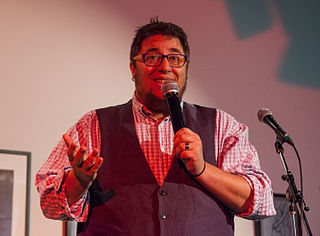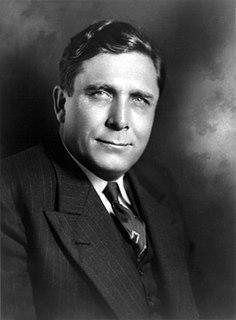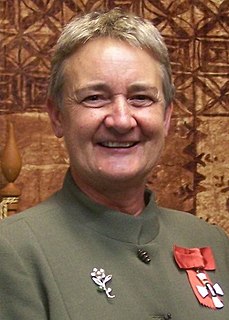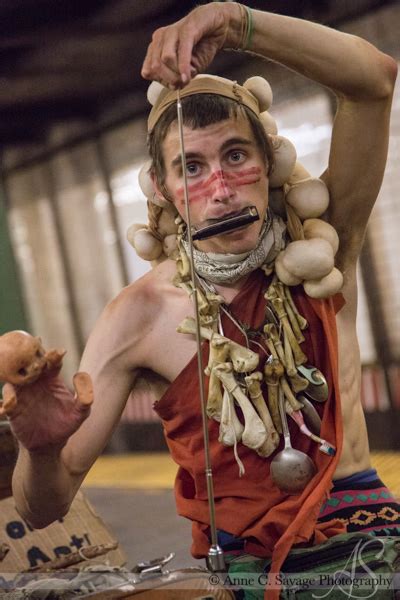Top 841 Fabric Quotes & Sayings - Page 14
Explore popular Fabric quotes.
Last updated on April 20, 2025.
What can be more foolish than to think that all this rare fabric of heaven and earth could come by chance, when all the skill of art is not able to make an oyster? To see rare effects, and no cause ; a motion, without a mover ; a circle, without a centre ; a time, without an eternity ; a second, without a first : these are things so against philosophy and natural reason, that he must be a beast in understanding who can believe in them. The thing formed, says that nothing formed it ; and that which is made is, while that which made it is not, This folly is infinite.
Downtown Cairo is at the center of the city, it is a place that has to be shared between different classes. It's a place where you see the bigger picture of the city's social fabric. It's also a place where you see all the contradictions of having all these layers, classes, and differences at the same time. And this is also where they clash, and where they negotiate. They negotiate their demands, their tastes, the lifestyles they want to have. So it's a very interesting space. I think that Downtown has maintained that identity before, during, and after the revolution.
Since the fabric of the universe is most perfect and the work of a most wise Creator, nothing at all takes place in the universe in which some rule of maximum or minimum does not appear ... there is absolutely no doubt that every affect in the universe can be explained satisfactorily from final causes, by the aid of the method of maxima and minima, as it can be from the effective causes themselves ... Of course, when the effective causes are too obscure, but the final causes are readily ascertained, the problem is commonly solved by the indirect method.
Remember - the fault is in the garment, certainly not the girl. There is nothing whatsoever wrong with the shape of her. Some designers cut their clothes for certain body types and others for others. Occasionally the pattern will make her ass look strangely square or the fabric will cling in an unflattering way, but Not Cut Well is always the answer, and it has the extremely delightful quality of saving your ass and being completely true at the same time. Use it wisely.
Our way of living together in America is a strong but delicate fabric. It is made up of many threads. It has been woven over many centuries by the patience and sacrifice of countless liberty-loving men and women. It serves as a cloak for the protection of poor and rich, of black and white, of Jew and Gentile, of foreign and native born. Let us not tear it asunder. For no man knows, once it is destroyed, where or when man will find its protective warmth again.
It ought to concern every person, because it is a debasement of our common humanity. It ought to concern every community, because it tears at our social fabric. It ought to concern every business, because it distorts markets. It ought to concern every nation, because it endangers public health and fuels violence and organized crime. I’m talking about the injustice, the outrage, of human trafficking, which must be called by its true name - modern slavery.
There has been a controversy started of late, much better worth examination, concerning the general foundation of Morals; whether they be derived from Reason, or from Sentiment; whether we attain the knowledge of them by a chain of argument and induction, or by an immediate feeling and finer internal sense; whether, like all sound judgement of truth and falsehood, they should be the same to every rational intelligent being; or whether, like the perception of beauty and deformity, they be founded entirely on the particular fabric and constitution of the human species.
Well, mi amore, this is awesome news! Let's get right on that," said Kami, and began to undo the buttons of her blouse. She looked down at the red buttons slipping out one by one from the black fabric of her shirt. She only had eight buttons, and there went the fourth. Jared sucked breath out of a horrified void and shouted, "stop that!" He angled himself to protect her from the eyes of a crowd that was not there. He hesitated, possibly because now he had a view directly down into shadows and curves.
The circus tent was flowing pale in the rain like a fleshy flower lit from within. It seemed to bloom in the downpour. Drops of rain caught on Rafe's eyelashes, blinding him as the circus light struck them. He groped for the flap, that slit in the fabric that would reveal her to him. She was on the rope again, her skirt flashing with tiny mirrors, hair braided with petals. He looked up at her, dizzy with it, seeing her face framed in the parasol. There were bluish shadows around her eyes.
I don't think I'm wrong when I say that the most beautiful objects of the "stone age" were made of skin, fabric, and especially wood. The "stone age" ought to be called the "wood age." How many African statues are made of stone, bone, or ivory? Maybe one in a thousand! And prehistoric man had no more ivory at his disposal than African tribes. Maybe even less. He must have had thousands of wooden fetishes, all gone now.
Cosmetic surgery is not "cosmetic," and human flesh is not "plastic." Even the names trivialize what it is. It's not like ironing wrinkles in fabric, or tuning up a car, or altering outmoded clothes, the current metaphors. Trivialization and infantilization pervade the surgeons' language when they speak to women: "a nip," a "tummy tuck."...Surgery changes one forever, the mind as well as the body. If we don't start to speak of it as serious, the millennium of the man-made woman will be upon us, and we will have had no choice.
[I]f a man bred to the seafaring life, and accustomed to think and talk only of matters relating to navigation, enters into discourse upon any other subject; it is well known, that the language and the notions proper to his own profession are infused into every subject, and all things are measured by the rules of navigation: and if he should take it into his head to philosophize concerning the faculties of the mind, it cannot be doubted, but he would draw his notions from the fabric of the ship, and would find in the mind, sails, masts, rudder, and compass.
Conceive a jelly-fish such as sails in our summer seas, bell-shaped and of enormous size - far larger, I should judge, than the dome of St. Paul's. It was of a light pink colour veined with a delicate green, but the whole huge fabric so tenuous that it was but a fairy outline against the dark blue sky. It pulsated with a delicate and regular rhythm. From it there depended two long drooping, green tentacles, which swayed slowly backwards and forwards. This gorgeous vision passed gently with noiseless dignity over my head, as light and fragile as a soap-bubble, and drifted upon its stately way.
From Man or Angel the great Architect Did wisely to conceal, and not divulge, His secrets, to be scanned by them who ought Rather admire. Or, if they list to try Conjecture, he his fabric of the Heavens Hath left to their disputes - perhaps to move His laughter at their quaint opinions wide Hereafter, when they come to model Heaven And calculate the stars: how they will wield The mighty frame: how build, unbuild, contrive To save appearances; how gird the Sphere With Centric and Eccentric scribbled o'er, Cycle and Epicycle, Orb in Orb.
Love was a sacred garment, woven of a fabric so thin that it could not be seen, yet so strong that even mighty death could not tear it, a garment that could not be frayed by use, that brought warmth into what would otherwise be an intolerable, cold world- but at times love could also be as heavy as chain mail. Bearing the burden of love, on those occasions when it was a solemn weight, made it more precious when, in better times, it caught the wind in sleeves like wings, and lifted you.
What happens to the mind of a person, and the moral fabric of a nation, that accepts the aborting of the life of a baby without a pang of conscience? What kind of a person and what kind of a society will we have twenty years hence if life can be taken so casually? It is that question, the question of our attitude, our value system, and our mind-set with regard to the nature and worth of life itself that is the central question confronting mankind. Failure to answer that question affirmatively may leave us with a hell right here on earth.
So far as we know, Earth is the only planet which supports life, and it is the only planet on which we can survive. Our bodies and our minds are fashioned by it. Our hearts resonate with it. There will be little joy for the human spirit if we destroy the natural fabric of Earth with nothing left to do but go shopping. When we imagine the world a century from now, when we look our great grandchildren in the eye and see them smiling back at us because they know we cared for them, we smile too!
American culture is no longer created by the people... A free, authentic life is no longer possible in AmericaTM today. We are being manipulated in the most insidious way. Our emotions, personalities and core values are under siege from media and cultural forces too complex to decode. A continuous product message has woven itself into the very fabric of our existence. Most North Americans now live designer lives-sleep, eat, sit in car, work, shop, watch TV, sleep again. I doubt there's more than a handful of free, spontaneous minutes anywhere in that cycle. We ourselves have been branded.
The whole history of these books (i.e. the Gospels) is so defective and doubtful that it seems vain to attempt minute enquiry into it: and such tricks have been played with their text, and with the texts of other books relating to them, that we have a right, from that cause, to entertain much doubt what parts of them are genuine. In the New Testament there is internal evidence that parts of it have proceeded from an extraordinary man; and that other parts are of the fabric of very inferior minds. It is as easy to separate those parts, as to pick out diamonds from dunghills.
I wanted to feel good about the way I looked. I didn't understand why style had to be sacrificed for sports technology. I found when going to the gym women were wearing their own tees, without the technology. I started to think, does it make you run faster if you wear that terrible color or sweat less if you wear that horrible fabric? And I challenged it, and the answers were not there to why we were being given poor design work. It was something I wanted to bring to women's wardrobes.
I don't think there's a right or wrong things in your style. It's about how you clearly reflect who you are; how you more clearly tell the story. Who are you? How do you want to transmit that to the world, and how do you more clearly say that? Then I have a philosophy, FFPS: fit, fabric, proportion, and silhouette. Proportion's everything, really, knowing your body and understanding that. Those things have been really crucial for me. It's about being clear about the story you want to tell to the world about who you are - and maybe a little bit of FFPS.
Through me you pass into the city of woe: Through me you pass into eternal pain: Through me among the people lost for aye. Justice the founder of my fabric moved: To rear me was the task of power divine, Supremest wisdom, and primeval love. Before me things create were none, save things Eternal, and eternal I shall endure. All hope abandon, ye who enter here.
Steve Grand is the creator of what I think is the nearest approach to artificial life so far, and his first book, Creation: Life and How to Make It, is as interesting as you would expect. But he illuminates more than just the properties of life: his originality extends to matter itself and the very nature of reality. Not since David Deutsch's The Fabric of Reality have I encountered such a compelling invitation to think everything out afresh, from the bottom up.
Scientists themselves readily admit that they do not fully understand the consequences of our many-faceted assault upon the interwoven fabric of atmosphere, water, land and life in all its biological diversity. But things could also turn out to be worse than the current scientific best guess. In military affairs, policy has long been based on the dictum that we should be prepared for the worst case. Why should it be so different when the security is that of the planet and our long-term future?
If Muslims want to take their disputes to religious arbitrators because they genuinely believe that it's a matter of great spiritual importance that they do that, they shouldn't be the only community in this country that's denied the opportunity to do that. Because the Jewish population has been entitled to take their disputes to tribunals known as the Beth Din for over one hundred years, and the Church of England is integrated into the fabric of this country, and there are ecclesiastical tribunals where religious disputes can be dealt with.
It is a matter of glimpsing that in God's new creation, of which Jesus's resurrection is the start, all that was good in the original creation is reaffirmed. All that has corrupted and defaced it--including many things which are woven so tightly in to the fabric of the world as we know it that we can't imagine being without them--will be done away. Learning to live as a Christian is learning to live as a renewed human being, anticipating the eventual new creation in and with a world which is still longing and groaning for that final redemption.
A letter is not a dialogue or even an omniscient exposition. It is a fabric of surfaces, a mask, a form as well suited to affectations as to the affections. The letter is, by its natural shape, self-justifying; it is one's own evidence, deposition, a self-serving testimony. In a letter the writer holds all the cards, controls everything about himself and about those assertions he wishes to make concerning events or the worth of others. For completely self-centered characters, the letter form is a complex and rewarding activity.
One of the crucial underpinnings of New York as a culture capital is that there are multiple markets. There is not just one art gallery district, there are several art gallery districts. I feel that there should be art galleries and art studios in every neighborhood without exception. They should be integrated into the social and physical fabric of the streets. If we want a lively city, we can't just have high towers and dense constructions, we have to have living organisms of streets and neighborhoods. And the arts are a crucial part of that.
Yes, the highest things are beyond words. That is probably why all art aspires to the condition of wordlessness. When literature works on you, it does so in silence, in your dreams, in your wordless moments. Good words enter you and become moods, become the quiet fabric of your being. Like music, like painting, literature too wants to transcend its primary condition and become something higher. Art wants to move into silence, into the emotional and spiritual conditions of the world. Statues become melodies, melodies become yearnings, yearnings become actions.
She praised his book and he embraced her from gratitude rather than lust, but she didn't let go. Neither did he. She kissed his cheek, his earlobe. For months they'd run their fingers around the hem of their affection without once acknowledging the fabric. The circumference of the world tightened to what their arms encompassed. She sat on the desk, between the columns of read and unread manuscript, and pulled him toward her by his index fingers.
Just the way sound creates visible waves as it travels through a droplet of water, our "belief waves" ripple through the quantum fabric of the universe to become our bodies and the healing, abundance, and peace-or disease, lack, and suffering-that we experience in life. And just the way we can tune a sound to change its patterns, we can tune our beliefs to preserve or destroy all that we cherish, including life itself.
If you awaken from this illusion, and you understand that black implies white, self implies other, life implies death - or shall I say, death implies life - you can conceive yourself. Not conceive, but feel yourself, not as a stranger in the world, not as someone here on sufferance, on probation, not as something that has arrived here by fluke, but you can begin to feel your own existence as absolutely fundamental. What you are basically, deep, deep down, far, far in, is simply the fabric and structure of existence itself.
I try to weave a secret into each plot. It's the thread that holds the rest of the story fabric together. In fact, it's the reason for the story. I hint at the secret early on. Immediately I want the reader to get the feeling that something here isn't quite right. It helps maintain the suspense if a puzzling element is introduced in the first few pages of the book, but the answer isn't revealed until the final ones. Hopefully, readers want to know what the heck is really going on, and it's the desire to find out that keeps them turning pages.
Hospitality is always an act that benefits the host even more than the guest. The concept of hospitality arose in ancient times when the reciprocity was easier to see: in nomadic cultures, the food and shelter one gave to a stranger yesterday is the food and shelter one hopes to receive from a stranger tomorrow. By offering hospitality, one participates in the endless reweaving of a social fabric on which all can depend-thus the gift of sustenance for the guest becomes a gift of hope for the host.
The biggest surprise was a picture my mom sent me, just about the time that we were about to wrap up the book, of me as a 5-year-old dressed in my first Halloween costume that she made for me. I said, "What's this? I never saw this photo." And she said, "We made you this black-and-orange Halloween costume out of crepe paper" - we were too poor to have fabric back then - "and you wanted to go as the Queen Of Halloween." And I was like, "What?" And she said, "Yeah, the Princess Of Halloween, the Queen Of Halloween, something like that.
I have no doubt that there are Russian efforts to disturb the fabric of American democracy, but they're disruption efforts. The working theory behind the intelligence report on Russian interference in the president election is that Russia influenced American public opinion. We may not like that, but if it influenced American public opinion, at least in the guise of legitimate activity - which is what the report says - then there's nothing you can do about that. Where it would be improper and illegal would be if there was actual collusion in those efforts. We don't know that.
The capitalist engine is first and last an engine of mass production which unavoidably also means production for the masses. . . . It is the cheap cloth, the cheap cotton and rayon fabric, boots, motorcars and so on that are the typical achievements of capitalist production, and not as a rule improvements that would mean much to the rich man. Queen Elizabeth owned silk stockings. The capitalist achievement does not typically consist in providing more silk stockings for queens but in bringing them within reach of factory girls.
We are nothing but the product of billions of years of molecules coming together and ratcheting up through natural selection, we are composed only of highways of fluids and chemicals sliding along roadways within billions of dancing cells, trillions of synaptic conversations hum in parallel, this vast egglike fabric of micron-thin circuitry runs algorithms undreamt of in modern science, and these neural programs give rise to our decision making, loves, desires, fears, and aspirations. That understanding would be a numinous experience, better than anything ever proposed in anyone's holy text.
The only footwear I need is an inexpensive pair of blue sneakers. They have soft fabric tops and soft rubber-like soles. I get them one size too large so I can wiggle my toes. I feel as free as though I were barefoot! And I can usually get 1,500 miles to a pair. I wear a pair of navy blue socks.There's a reason why I chose navy blue for my wearing apparel-it's a very practical color, doesn't show dirt, and the color blue does represent peace and spirituality.
Storytelling, you know, has a real function. The process of the storytelling is itself a healing process, partly because you have someone there who is taking the time to tell you a story that has great meaning to them. They're taking the time to do this because your life could use some help, but they don't want to come over and just give advice. They want to give it to you in a form that becomes inseparable from your whole self. That's what stories do. Stories differ from advice in that, once you get them, they become a fabric of your whole soul. That is why they heal you.
My mother gave me very good advice years ago. I grew up in the Great Depression and she always told me to get a good little basic black dress - well-cut, well-made, good fabric - and it could take me through everything. I could go to the office in the morning and stay out all day in the same dress. Just by changing accessories, because they are so transformative, you can make six different outfits. I find that very useful. My mother worshipped at the altar of accessories and I'm an accessory freak, as everybody knows. That, I got from my mother.
If we suddenly plant our foot, and say, - I will neither eat nor drink nor wear nor touch any food or fabric which I do not know to be innocent, or deal with any person whose whole manner of life is not clear and rational, we shall stand still. Whose is so? Not mine; not thine; not his. But I think we must clear ourselves each one by the interrogation, whether we have earned our bread to-day by the hearty contribution of our energies to the common benefit? and we must not cease to tend to the correction of these flagrant wrongs, by laying one stone aright every day.
Only within the 20th Century has biological thought been focused on ecology, or the relation of the living creature to its environment. Awareness of ecological relationships is - or should be - the basis of modern conservation programs, for it is useless to attempt to preserve a living species unless the kind of land or water it requires is also preserved. So delicately interwoven are the relationships that when we disturb one thread of the community fabric we alter it all - perhaps almost imperceptibly, perhaps so drastically that destruction follows.
I certainly have no regrets about overthrowing Saddam Hussein. I'd do it again. And, yes, there are a lot of things that I think we'd all do differently. Maybe we made some erroneous assumptions about the fabric of the society in Iraq and about the solidity of some of the institutions. And yes, there are a lot of things I would do differently. I'd probably work to rebuild Iraq from the outside in, rather than concentrating so much on Baghdad, for instance.
If a country develops an economic system that is based on how to pay for the war, and if the amounts of fixed capital investment that are apparent are tied up in armaments, and if that country is a major exporter of arms, and its industrial fabric is dependent on them, then it would be in that country's interests to ensure that it always had a market. It is not an exaggeration to say that it is clearly in the interests of the world's leading arms exporters to make sure that there is always a war going on somewhere.
I have, for my own projected works and ideas, only the silliest and dewiest of hopes; no matter what, I am romantic enough or sentimental enough to wish to contribute something to life's fabric, to the world's beauty.... [S]imply to live does not justify existence, for life is a mere gesture on the surface of the earth, and death a return to that from which we had never been wholly separated; but oh to leave a trace, no matter how faint, of that brief gesture! For someone, some day, may find it beautiful!
Capitalism rules worldwide, and a society whose economic fabric depends on constant growth requires that its citizens have ever-expanding needs and wants... In the West, it will take one with soul force equal to Gandhi's to change the prevailing dogma of ever increasing GNP. We may be forced to change our profligate ways some day, when the soil is depleted, the aquifers drained, the icecaps melted, and all the oil wells pumped dry. But the crisis will wait another fifty years or so; we'll leave those problems to a generation yet unborn.
I’m trying to embroider.” Hyacinth held up her handiwork as proof. “You’re trying to avoid—” Her mother stopped, blinking. “I say, why does that flower have an ear?” “It’s not an ear.” Hyacinth looked down. “And it’s not a flower.” “Wasn’t it a flower yesterday?” “I have a very creative mind,” Hyacinth ground out, giving the blasted flower another ear. “That,” Violet said, “has never been in any doubt.” Hyacinth looked down at the mess on the fabric. “It’s a tabby cat,” she announced. “I just need to give it a tail.
The lore of our fathers is a fabric of sentences. In our hands it develops and changes, through more or less arbitrary and deliberate revisions and additions of our own, more or less directly occasioned by the continuing stimulation of our sense organs. It is a pale gray lore, black with fact and white with convention. But I have found no substantial reasons for concluding that there are any quite black threads in it, or any white ones.
When I was a young girl salmon fishing with my father in the Straits of Juan de Fuca in Washington State I used to lean out over the water and try to look past my own face, past the reflection of the boat, past the sun and darkness, down to where the fish were surely swimming. I made up charm songs and word-hopes to tempt the fish, to cause them to mean biting my hook. I believed they would do it if I asked them well and patiently and with the right hope. I am writing my poems like this. I have used the fabric and the people of my life as the bait.
It's the ultimate for me not to see how it's made. I find it vulgar when you can distinguish how something is made. I used to be a student at the Chambre Syndicale de la Haute Couture in Paris, and once I got to go to a Saint Laurent couture show. Everyone was always talking about how fabulous the tailoring was, but I was transfixed by this one particular dress. It was just a piece of fabric, but as the model was walking, you didn't know how she got into it, how it closed, where the seams were, and that, for me, was perfection. It stayed with me as a lifelong vision.
This government to government relationship is the result of sovereign and independent tribal governments being incorporated into the fabric of our Nation, of Indian tribes becoming what our courts have come to refer to as quasi-sovereign domestic dependent nations. Over the years the relationship has flourished, grown, and evolved into a vibrant partnership in which over 500 tribal governments stand shoulder to shoulder with the other governmental units that form our Republic.
The zooming wealth of the top 1 percent is a problem, but it's not nearly as big a problem as the tens of millions of Americans who have dropped out of high school or college. It's not nearly as big a problem as the 40 percent of children who are born out of wedlock. It's not nearly as big a problem as the nation's stagnant human capital, its stagnant social mobility and the disorganized social fabric for the bottom 50 percent.
Oho, now I know what you are. You are an advocate of Useful Knowledge.... Well, allow me to introduce myself to you as an advocate of Ornamental Knowledge. You like the mind to be a neat machine, equipped to work efficiently, if narrowly, and with no extra bits or useless parts. I like the mind to be a dustbin of scraps of brilliant fabric, odd gems, worthless but fascinating curiosities, tinsel, quaint bits of carving, and a reasonable amount of healthy dirt. Shake the machine and it goes out of order; shake the dustbin and it adjusts itself beautifully to its new position.
The land on which they (the Founding Fathers) formed this Union was stolen. The hands with which they built this nation were enslaved. The women who birthed the citizens of the nation are second class. This is the imperfect fabric of our nation, at times we’ve torn and stained it, and at other moments, we mend and repair it. But it’s ours, all of it. The imperialism, the genocide, the slavery, also the liberation and the hope and the deeply American belief that our best days still lie ahead of us.
If you are a designer, sometimes it is better not to delegate, because someone pays money for something that you designed, so it should be exactly the way you want it, exactly the way you would have chosen it. People call me a control freak, and I say, "Well, my name is on the shoe." It means the heel needs to be the way I want it and not the way somebody else wants it, and the toe needs to be exactly the way I want it, and the fabric and the material have to be exactly the way I want it. It is not a democracy - it is a dictatorship.
Day 24. Situation is growing worse. My captors continue to find new and horrific ways to torture me. When not working, Agent Scarlet spends her days examining fabric swatches for bridesmaid dresses and going on about how in love she is. This usually causes Agent Boring Borscht to regale us with stories of Russian weddings that are even more boring than his usual ones. My attempts at escape have been thwarted thus far. Also, I am out of cigarettes. Any assistance or tobacco products you can send will be greatly appreciated. -Prisoner 24601
I’m not doing anything wrong, I’m not obstructing anyone’s access. When I have a crowd I make sure that the crowd makes room for people. I’m an artist who cares about the cultural fabric of New York City. I care about New York as a harbor for street culture - and I care about street culture as a base-level populist diffusion of ideas. And I believe in making those ideas accessible to everyone.
What children don't understand, and can't understand until they grow up some, is how much the whole fabric and process of human society depends on everybody agreeing to ignore, most of the time, the fact that all of us are, most of the time, inadequate, incompetent, pitiful, and, in fact, naked to our enemies. None of us really has very much in the way of spiritual, moral clothing. We dress ourselves in rags. And we agree to say nothing about it. To a very large extent, it is human charity that clothes us.



























































